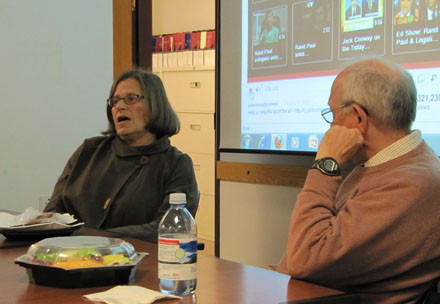
November 2, 2010 — On Election Day, the Shorenstein Center welcomed Renée Loth, Boston Globe columnist, to discuss this year’s midterm campaign’s particular influx of political attack ads.
This has been “the most expensive midterm election in the history of the country,” said Loth, with more than $4 billion spent on advertising. There has been a “flood” of political ads, and the “majority of them are negative.”
Accounting for an increased amount of negativity in campaign ads, Loth pointed out, is the Supreme Court decision from this past January. “The Citizens United decision that equated corporations with people and money with speech,” she explained, provided a “protective shield” of anonymity to “shadowy nonprofit third-party groups.” These groups are often nationally based and sometimes do not even receive funds from the districts they target. As a result, there is a growing phenomenon of “the nationalizing of local campaigns,” Loth said. In Massachusetts, the ballot questions are “attracting national money and national attention” from unions, corporations and third-party organizations.
In 1992, Loth started AdWatch at the Globe, “to analyze campaign ads for their accuracy and effectiveness.” Back then, Loth recalled, campaigns would often not admit or acknowledge that they produced negative ads, making them difficult for journalists to track. Now with the Internet and YouTube, campaigns actually promote their own attack ads. One organization went so far as to issue a press release boasting of its “scathing” ad attacking a candidate, Loth said.
The volume of negative ads has increased so much that fact-checking organizations “can’t keep up,” Loth said. She provided four examples of ads that manipulated facts, misinterpreted quotes and provided misinformation. Such negative ads often use citations from media sources that are “supposed to give the ad a gloss of veracity and authenticity,” Loth said, but they actually “give the ads more respectability than they deserve,” because often the facts have been “distorted or manipulated.”
When asked what effect attack ads have on campaigns and elections, Loth concluded that “whether they help one side or hurt the other, or depress turnout or excite it, they do have the effect of demeaning our debate, coarsening the debate … and that’s not good for democracy.”
This article was written by Janell Sims and the photos taken by Leighton Walter Kille, both of the Shorenstein Center.

